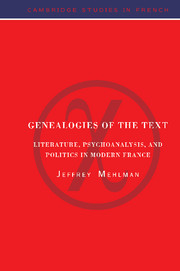Book contents
- Frontmatter
- Contents
- Acknowledgments
- 1 Introduction
- 2 Craniometry and criticism: notes on a Valéryan criss-cross
- 3 Literature and hospitality: Klossowski's Hamann
- 4 Literature and collaboration: Benoist-Méchin's return to Proust
- 5 “Pierre Menard, author of Don Quixote” again
- 6 Iphigenia 38: deconstruction, history, and the case of L'Arrêt de mort
- 7 Writing and deference: the politics of literary adulation
- 8 Perspectives: on Paul de Man and Le Soir
- 9 Prosopopeia revisited
- 10 The paranoid style in French prose: Lacan with Léon Bloy
- 11 The Holocaust comedies of “Emile Ajar”
- 12 Pour Sainte-Beuve: Maurice Blanchot, 10 March 1942
- 13 Flowers of evil: Paul Morand, the Collaboration, and literary history
- Appendix
- Notes
- Index
- Series list
5 - “Pierre Menard, author of Don Quixote” again
Published online by Cambridge University Press: 19 January 2010
- Frontmatter
- Contents
- Acknowledgments
- 1 Introduction
- 2 Craniometry and criticism: notes on a Valéryan criss-cross
- 3 Literature and hospitality: Klossowski's Hamann
- 4 Literature and collaboration: Benoist-Méchin's return to Proust
- 5 “Pierre Menard, author of Don Quixote” again
- 6 Iphigenia 38: deconstruction, history, and the case of L'Arrêt de mort
- 7 Writing and deference: the politics of literary adulation
- 8 Perspectives: on Paul de Man and Le Soir
- 9 Prosopopeia revisited
- 10 The paranoid style in French prose: Lacan with Léon Bloy
- 11 The Holocaust comedies of “Emile Ajar”
- 12 Pour Sainte-Beuve: Maurice Blanchot, 10 March 1942
- 13 Flowers of evil: Paul Morand, the Collaboration, and literary history
- Appendix
- Notes
- Index
- Series list
Summary
In an influential essay on Borges and his lessons for literary criticism, Gérard Genette, in his first volume of Figures, pays particular attention to the Argentine's celebrated parable of Pierre Menard, “Symbolist from Nîmes,” and his quixotic decision not to copy, but to rewrite – “word for word and line for line” – Cervantes' masterwork. The specific techniques brought to the art of reading by Menard's exploit, writes the narrator, are those of “deliberate anachronism” and “erroneous attribution.” Genette warms to Borges' suggestion, but ultimately veers toward a more “structuralist” intuition that, in the last analysis, authorial attribution itself – be it true or false – is our critical error or self-imposed impoverishment. The true Borgesian payoff, Genette suggests, comes with the awareness that literature itself may be read as a vast anonymous text, reversible in time, homogeneous in space: “l'utopie littéraire,” as he entitles his piece. As though the critic, in Paris, were inclined to read Menard's Nîmes the way Jarry reads Ubu's Poland – as nowhere.
No, it will be responded, not Jarry's Poland, but Valéry's Montpellier, barely an hour's drive from Nîmes. Menard, after all, is cousin to Monsieur Teste, and Genette has but reclaimed for French letters one of the extreme possibilities dreamed by France's premier poetician. Perhaps. Yet consider that with the displacement of Menard, the westering of Nîmes, the piquancy of Borges' text has been obliterated. If the “rhetorical eulogy of history” Borges quotes from Cervantes is not imagined as written by “a contemporary of William James,” Anachronism loses its hold on the text. If its author is no one in particular, Erroneous Attribution drops out of the equation.
- Type
- Chapter
- Information
- Genealogies of the TextLiterature, Psychoanalysis, and Politics in Modern France, pp. 67 - 81Publisher: Cambridge University PressPrint publication year: 1995



